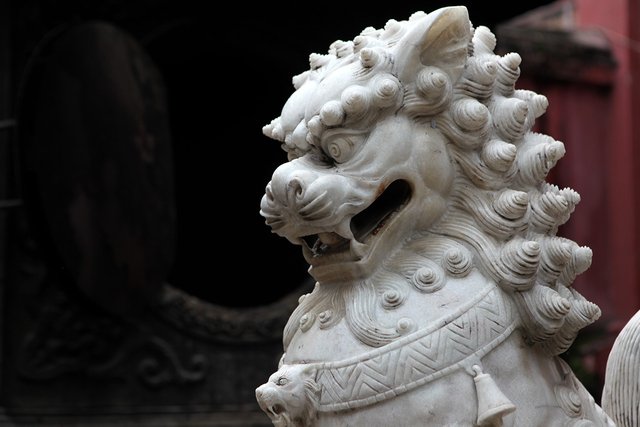Lion-Eating Poet in the Stone Den

The main achievement of any nation is its language. This is not just a means of communication and a way of transferring accumulated knowledge, but also a way of thinking and expressing of personality. Today science knows more than 7000 languages, and each one is unique.
Language can die with the last carrier, but if it has developed into writing, it has high chances to survive for centuries. Therefore, the writing, as the result of the evolution of language, is inextricably linked with it.
In the early 20th century, Chinese-American linguist Zhao Yuanren demonstrated how is important to save connection of oral language with written language. And he chose a very funny and paradoxical way...
In Chinese speech is very important intonation, tall sounds and tones. The same sound uttered in different heights and with different tone, will differ in meaning.
Zhao Yuanren wrote a poem "施氏食獅史" in classical Chinese language of 92 syllables. Each of these syllables is read and sounds as shí in one of four tones. With the original Chinese characters this poem looks like:
《施氏食獅史》
石室詩士施氏, 嗜獅, 誓食十獅。
氏時時適市視獅。
十時, 適十獅適市。
是時, 適施氏適市。
氏視是十獅, 恃矢勢, 使是十獅逝世。
氏拾是十獅屍, 適石室。
石室濕, 氏使侍拭石室。
石室拭, 氏始試食是十獅。
食時, 始識是十獅, 實十石獅屍。
試釋是事。
If you studied the Chinese language or you are a carrier, you will easily be able to read and understand this poem. Yes it has a bit of an absurd plot, but still with meaning.
For those who don't know Chinese (as I), let's translate it into English:
Lion-Eating Poet in the Stone Den A poet named Shi lived in a stone room,
fond of lions, he swore that he would eat ten lions.
He constantly went to the market to look for ten lions.
At ten o'clock, ten lions came to the market
and Shi went to the market.
Looking at the ten lions, he relied on his arrows
to cause the ten lions to pass away.
Shi picked up the corpses of the ten lions and took them to his stone room.
The stone room was damp. Shi ordered a servant to wipe the stone room.
As the stone den was being wiped, Shi began to try to eat the meat of the ten lions.
At the time of the meal, he began to realize that the ten lion corpses
were in fact were ten stone lions.
Try to explain this matter.
Now the funny thing: let's look at this poem in written form, if you use Pinyin (the official romanization system for Standard Chinese).
«Shī Shì shí shī shǐ» Shíshì shīshì Shī Shì, shì shī, shì shí shí shī.
Shì shíshí shì shì shì shī.
Shí shí, shì shí shī shì shì.
Shì shí, shì Shī Shì shì shì.
Shì shì shì shí shī, shì shǐ shì, shǐ shì shí shī shìshì.
Shì shí shì shí shī shī, shì shíshì.
Shíshì shī, Shì shǐ shì shì shíshì.
Shíshì shì, Shì shǐ shì shí shì shí shī.
Shí shí, shǐ shí shì shí shī, shí shí shí shī shī.
Shì shì shì shì.
And that's how this poem sounds:


Haha it is fun to read the poem. Although we can translate one language to another , some words and their meanings lose their influence while translating. It is the only drawback.
True! It is in the feeling of words that make languages unique.